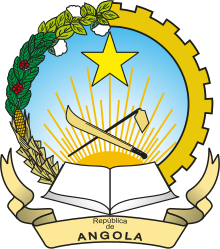| English: 'Onwards Angola' | |
|---|---|
 | |
National anthem of | |
| Lyrics | Manuel Rui, 1975 |
| Music | Ruy Mingas |
| Adopted | 1975 |
| Audio sample | |
"Angola Avante" (English: "Onwards Angola", lit. '"Angola onward"') is the national anthem of Angola. Ruy Mingas composed the music, while the lyrics were authored by Manuel Rui. It was adopted as the national anthem in November 1975, when the country gained its independence from Portugal. The lyrics make reference to several key events of the People's Movement for the Liberation of Angola (MPLA), which has been in power since independence and was the only party in Angola until 1992.
History
"Angola Avante" was composed by Ruy Mingas. The lyrics to the song were penned by Manuel Rui Alves Monteiro (1941–), an author who studied in Huambo and is affiliated with both the country's Writer Union and Union of Artists and Composers. He is one of the best-selling writers in the capital city Luanda – according to an "informal survey" conducted in July 2003 – and writes about "everyday life" in the country using satire and irony. The song was officially designated as the country's national anthem in 1975, when the country gained independence on 11 November that year. It is enshrined under Article 164 of the constitution of Angola.
Proposed changes
Its lyrics refer to several key events in the history of the MPLA. However, this has been rendered "obsolete" since the end of the one-party state in 1992. As a result, there have been efforts to modify the national anthem, along with other national symbols. However, none of these have come to fruition, and the anthem remains unchanged as of 2014.
Lyrics
The lyrics of "Angola Avante" allude to how the country and its people will progress forward in the future. It has been classified by The Daily Telegraph′s Ivan Hewett as one of several contemporary national anthems that convey "a more martial tone" inspired by "La Marseillaise".
The latter third of both verses is usually considered refrain and repeated; the chorus is also repeated twice during each rendition.
Portuguese (official language)
| Portuguese original | IPA transcription |
|---|---|
|
I |
1 |
Kikongo (national language)
| Kongo lyrics | IPA transcription |
|---|---|
|
I |
1 |
English translation
|
I |
In popular culture
The name of the national anthem is used as a nickname for an inter-community association football competition held to boost sports activities both in Angola and among people from the Portuguese-speaking African countries (PALOP) living in Portugal. Hosted in Portugal in 2011 and 2013, the latter tournament featured teams from Brazil, Mozambique, Cape Verde, Guinea-Bissau, and São Tomé and Príncipe. The 2011 sporting event coincided with and honoured the 36th anniversary of the independence of Angola.
Notes
References
- ^ "Angola". The World Factbook. CIA. Retrieved August 16, 2014.
- "Rui Alberto Vieira Dias Mingas". Naxos.com. Naxos Records. Retrieved August 16, 2014.
- ^ James, W. Martin (May 5, 2011). Historical Dictionary of Angola. Scarecrow Press. p. 170. ISBN 9780810874589.
- Angola Country: Strategic Information and Developments. International Business Publications. March 20, 2009. p. 182. ISBN 9781438701677.
- ^ Minahan, James (December 1, 2009). The Complete Guide to National Symbols and Emblems: Volume 2. Greenwood Press. p. 776. ISBN 9780313345005.
- Savimbi, Jonas (July 9, 1995). "Lessons learned in Angola". The Washington Times. p. B4. Retrieved August 16, 2014.
- Power, Marcus (2012). "Angola 2025: The Future of the 'World's Richest Poor Country' as Seen through a Chinese Rear-View Mirror". Antipode. 44 (3): 995. doi:10.1111/j.1467-8330.2011.00896.x. (registration required)
- Hewett, Ivan (July 26, 2011). "National anthems – must we hear more of them?". The Daily Telegraph. Retrieved August 16, 2014.
- "Hino Angolano". República de Angola Consulado Geral no Rio de Janeiro. Archived from the original on 2019-12-06. Retrieved 2019-08-23.
- "Anexo III – Hino Nacional, "Angola Avante"". ConstituicaoRepublicaAngola. Retrieved 2019-08-23.
- "Hino nacional de Angola em Kikongo". Wizi-Kongo (in Portuguese). 2016-10-16. Retrieved 2019-08-23.
- "Angola National Anthem Lyrics". Lyrics on Demand. Retrieved 2019-08-23.
- ^ "Angola and Cape Verde in 'Angola Avante' cup finals". Angola News Agency (ANGOP). November 2, 2011. Archived from the original on August 16, 2014. Retrieved August 16, 2014.
- "Country through to final of 'Angola Avante' football tournament". Angola News Agency (ANGOP). November 5, 2013. Archived from the original on August 16, 2014. Retrieved August 16, 2014.